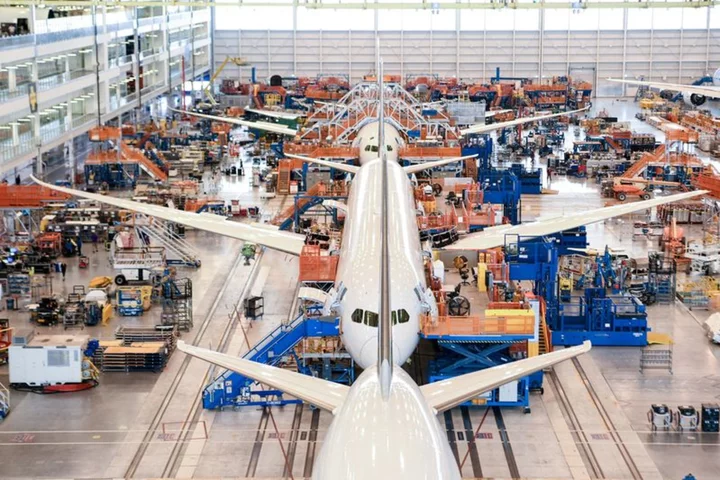By Valerie Insinna and David Shepardson
WASHINGTON (Reuters) -Boeing said on Tuesday it could be forced to slow deliveries of all 90 of the 787 Dreamliner jets in its inventory after the company discovered a new production flaw, the latest in a series of setbacks for the widebody plane.
While the newly-found production hiccup does not pose a flight safety concern, it follows an month-long 787 delivery stoppage that was resolved in March and adds yet another delay for Boeing as the U.S. planemaker struggles to rework the planes before they can be delivered to customers.
The problem involves a fitting for the 787's horizontal stabilizer installed by a Boeing production facility in Salt Lake City, Utah, the company said. The horizontal stabilizer, located at the base of an aircraft's tail, allows a plane to maintain longitudinal balance while flying.
Boeing will need to inspect all 90 Dreamliners in its inventory before they can be delivered, and expects it will take two weeks to fix each aircraft, the company added.
The manufacturer said it found last week that the fitting included shimming - a material that fills gaps between the surfaces of an aircraft - that was improperly sized and did not meet specifications. On Friday, it stopped approving 787s suspected to have the flaw for delivery, the company said.
The issue does not immediately affect in-service 787s, Boeing said, but the company could not say how far back the issue stretches or whether Dreamliners currently operated by airlines will need a fix.
Boeing, which announced last week that it had increased 787 production from three to four jets a month, said the issue has not caused a halt in 787 production.
Boeing shares, which fell 2.4% immediately after the defect was announced, closed 0.7% lower on Tuesday.
The U.S. Federal Aviation Administration said in a statement it had validated Boeing's assessment that there was no immediate safety issue for 787s already in service.
The agency, however, said it would not issue any new airworthiness certificates for the 787 until the matter was addressed to its satisfaction.
The FAA typically delegates such authority to the manufacturer. But in some instances, like the 737 MAX and 787, it has retained responsibility for approving each new airplane.
Boeing said it has notified customers that rework would affect the timing of near-term 787 deliveries, but added that it believed it could still deliver 70 to 80 Dreamliners this year.
The 787's latest problem mirrors production issues discovered over 2020 and 2021 that included improperly fitted shimming that led to paper-thin gaps between surfaces on the Dreamliner's fuselage.
Boeing stopped 787 deliveries at multiple points during that period, resuming them last August after agreeing to an FAA-approved modification plan for Dreamliners in the company's inventory.
The company faced yet another 787 delivery stoppage in February after Boeing found a data analysis error regarding the forward pressure bulkhead that was unrelated to the shimming problem. In March, the FAA said it would allow Boeing to restart 787 deliveries, as the U.S. planemaker had addressed concerns.
The latest 787 production defect comes as Boeing grapples with a 737 bracket installation issue disclosed in April, which slowed deliveries of the cash-generating family of narrowbody jets, including the bestselling MAX 8 model.
Boeing CEO Dave Calhoun in April called the problem a "gnarly defect" that was nearly impossible for workers to visibly assess. The company said last month it had begun delivering reworked 737s.
(Reporting by Valerie Insinna and David Shepardson in Washington; Editing by Will Dunham, Deepa Babington and Jamie Freed)

